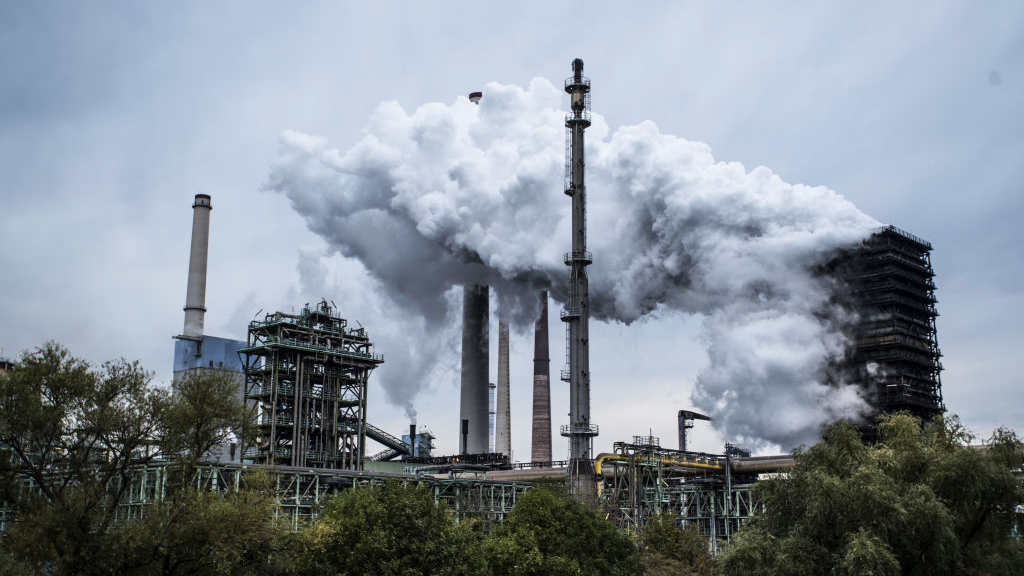
Lettering CO2 and drawing planet earth from grass and moss. /Getty
Lettering CO2 and drawing planet earth from grass and moss. /Getty
Editor's note: Keith Lamb is a University of Oxford graduate with an MSc degree in Contemporary Chinese Studies. His primary research interests are China's international relations and "socialism with Chinese characteristics." The article reflects the author's opinions and not necessarily the views of CGTN.
On April 16, Chinese President Xi Jinping attended a video summit with French President Emmanuel Macron and German Chancellor Angela Merkel, where they focused on climate issues.
Considering the ever-present attacks on China's system, which "threaten" to overwhelm the EU and China's common interests, this meeting was a timely reminder that protecting the deteriorating biosphere is a pillar that truly unites all of humanity.
In terms of carbon emissions in 2019, according to the Our World in Data, which was a non-profit project of the Global Change Data Lab founded by scholars in the United Kingdom, China emitted 10.17 billion tons, the U.S. 5.2 billion tons, and the EU 3.29 billion tons. Thus, as the first and third-largest polluters, their cooperation is essential. Looking at the figures, one may assume that China bears a special responsibility for climate change. While I would certainly not deny this, there are two mitigating factors.
Firstly, considering China's enormous population, its per capita carbon emissions are not significantly worse than the EU and, in fact, considerably better than the U.S.; secondly, much is manufactured in China. As such, foreign consumption contributes much to China's carbon figures.
No wonder then, it has been reported that President Xi Jinping was not particularly enamored with the EU's endorsement of a carbon tax which aims to shield EU companies from cheaper imports coming from countries with weaker climate policies. This scheme has been sold as part of the EU's green deal to meet the targets of the Paris Climate Agreement and achieve carbon neutrality by 2050.
From the Global South's vantage point, this carbon border tax could indeed be problematic as it could penalize those trying to get a foot on the path to development. Consequently, President Xi Jinping's view represents not just China's but the entire Global South. Indeed, Brazil, South Africa, India, and China have already penned a joint statement expressing their grave concerns.
My concern with the EU's proposed carbon tax is that it is less about environmental protection and more about maintaining its dominance in all fields at the expense of the Global South and the majority of humanity.
Poorer countries could lose out as the EU's measures, sold under the banner of environmentalism, could punish the neediest. Action on environmental protection is welcomed. However, for a number of reasons, the developed world has a greater responsibility to shoulder the environmental burden.
Firstly, the developed world heeded little attention to the environment when they developed. As such, they paid no pollution penalty for their development. Notably, in 1978, according to multiple data sources, including BP's Statistical Review of World Energy, China's carbon emissions stood at only 1.46 billion tons, while the EU and the U.S.'s were 4.57 and 4.88, respectively. The developed world emitted a mountain of carbon gas into the biosphere well before the Global South began their development.
Secondly, the developed West polluted because they primarily made products consumed by themselves. This contrasts to the developing world, which pollutes on behalf of making products that are used not just for themselves but for the developed world too.
Indeed, look at the typical Chinese citizen, and one will see that with their public transportation, their vociferous recycling habits, and their relatively modest consumption, they pollute far less than a citizen of either the EU or the United States.
Furthermore, as is obvious to anyone that has lived in China over the past five years, China cannot be said to be a slouch when it comes to environmental protection. This is quite spectacular considering the precedent that only when developed countries do start to take environmental concerns seriously.

Emissions rise from the Thyssenkrupp AG steel plant in Duisburg, Germany, October 20, 2020. /Getty
Emissions rise from the Thyssenkrupp AG steel plant in Duisburg, Germany, October 20, 2020. /Getty
The usual contradiction has been that under capitalist development, environmental protection decreases capital accumulation. When environmental legislation does come in neo-liberal open borders, and the Global South desperate for foreign capital, has allowed for polluting industries to be shipped abroad. Consequently, the cycle of profit accumulation for the few and pollution for the poor can continue.
This un-virtuous cycle is indeed what led to the large-scale de-industrialization of Europe and the U.S. as business flooded into China and other East Asian states. Of course, despite this de-industrialization, the poignant question is why does the EU and especially the U.S. still contribute so much to global carbon emissions?
Come what may, China has taken environmental responsibility to new heights in the Global South. At the meeting, President Xi Jinping declared once again that China will strive to peak carbon emissions by 2030 and achieve carbon neutrality by 2060. In addition, China has accepted the Kigali Amendment to the Montreal Protocol which will strengthen the control of non-carbon dioxide greenhouse gasses.
Along with these lines, there can be no doubting China's determination to build a green future for itself and the rest of the world. As part of Chinese people's centrist development protecting the environment is the fundamental basis of development itself and it must be a worldwide effort.
This long-term outlook on development is codified into the Xi Jinping Thought of Ecological Civilization where China's rejuvenation is linked to fresh air, greening the environment, recycling, and the sensible use of nature's resources.
This dream of overcoming the contradiction of development without destroying the environment is not just a dream for China but logically a dream for the whole of humanity too.
(If you want to contribute and have specific expertise, please contact us at opinions@cgtn.com.)

